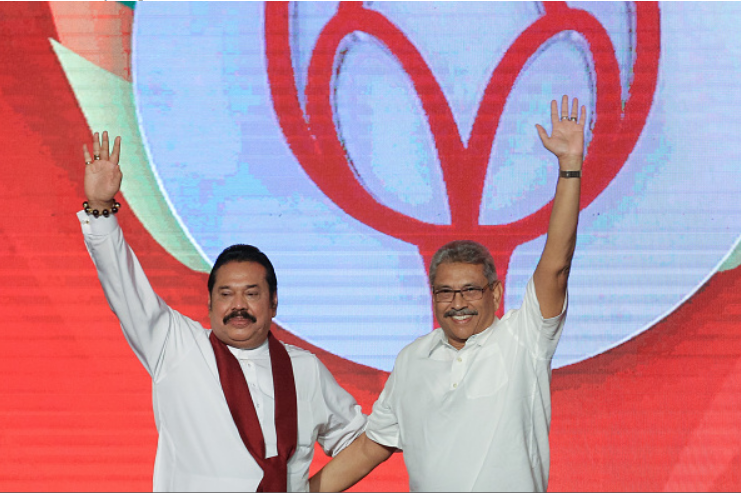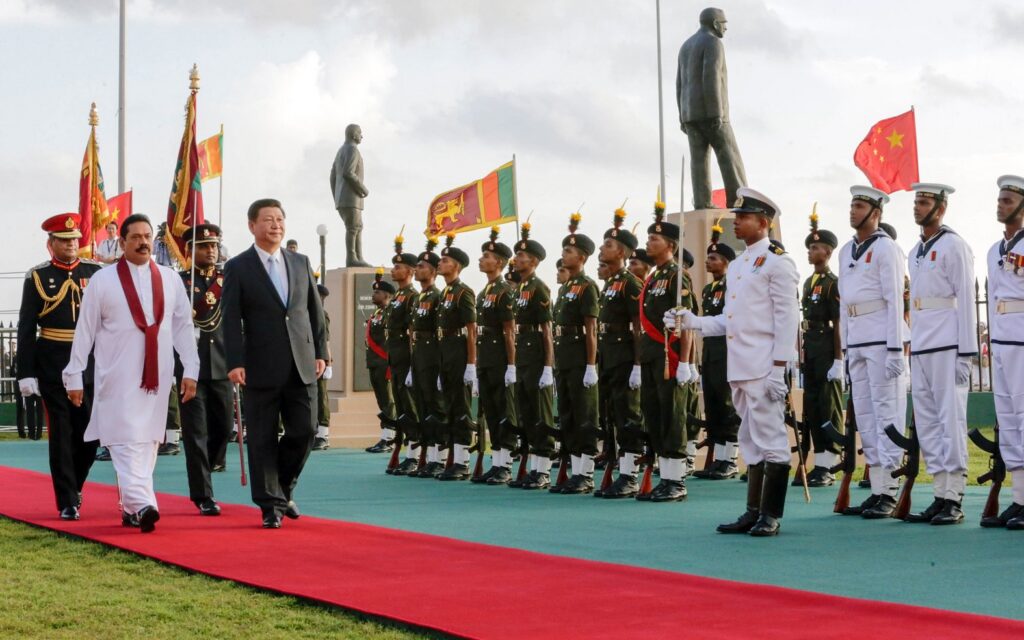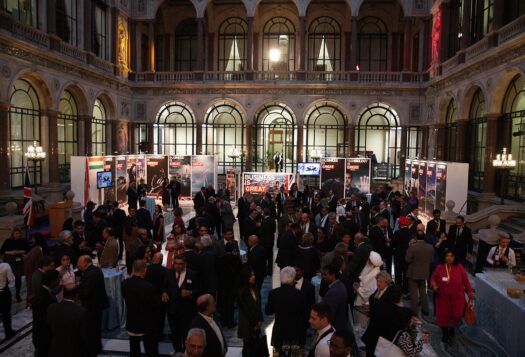
At the Biden administration’s Summit for Democracy this December, one of the oldest democracies in Asia, Sri Lanka, was kept off the invite list. The failure to receive an invitation reflects the ongoing democratic backsliding under the semi-autocratic rule of one family. Former military officer Gotabaya Rajapaksa and his brother, Mahinda Rajapaksa, respectively, hold the country’s two highest offices of President and Prime Minister. Along with serving other major roles in the administration themselves—Gotabaya is also Defense Minister—multiple family members have been appointed to crucial cabinet portfolios. A majoritarian regime was formed in 2020 with a quick constitutional amendment to remove critical checks on executive power and bring more legislative controls under the President. The brothers have also indicated a clear preference for military involving 28 current or former military and intelligence officials to the administration.
The centralization of power under the Rajapaksa family underscores the democratic backsliding in the country which continued throughout 2021. This in part has informed the Rajapaksa tilt towards China, a move that will shape not only domestic politics but also Sri Lanka’s economic future. As 2022 begins, the country finds itself facing a troubling set of challenges including economic crisis and strengthening majoritarian rule.
Domestic Politics: Deepening Divisions and an Authoritarian Slide
Over the past four decades, Sri Lanka has been engulfed by multiple internal and external security shocks. Its protracted civil war ending in 2009, the two youth insurrections in 1981 and 1989, and the extremist terror attack in 2019 underscore the security threats driven by political-economic dysfunctionality. In South Asia, the Taliban’s return to power after the U.S. exit and the rise of extremist sentiments could spill over to vulnerable nations like Sri Lanka. The lynching and burning of a Sri Lankan worker in Pakistan is an individual incident that has underscored the growing concerns of extremism. With the absence of regional security architecture and limited resources to curb extremist terror, Sri Lanka and South Asian nations may face a daunting challenge in the coming years.
Amidst concerns of extremism and internal instability, the Sri Lankan government’s hardline posture offers little hope of addressing minority concerns or pursuing a genuine reconciliation process promised since the end of the civil war.
Amidst concerns of extremism and internal instability, the Sri Lankan government’s hardline posture offers little hope of addressing minority concerns or pursuing a genuine reconciliation process promised since the end of the civil war. Minority communities, including Sri Lanka’s Muslim and Tamil populations, have been troubled by multiple events over the past year. In 2021, the government expanded the powers of the Prevention of Terrorism Act, which has repeatedly been used to justify arbitrary arrests. The arbitrary detentions are likely to trigger extremist sentiments, and Sri Lankan prisons could become breeding grounds for extremism. Three years after the brutal Easter Sunday attack, the government’s ultra-nationalist posture with the military at the forefront has triggered more insecurity.
For Sri Lanka, 2021 began with severe warning from the UNHCR on the alarming risks of human rights violations—a report that the government rejected. However, the concerns raised in the report came to the forefront later in the year with the appointment the ultra-nationalist Buddhist monk Galagodaththe Gnanasara Thero to lead the “One Country One Law” Presidential task force. Gnanasara had been imprisoned but was pardoned by President Rajapaksa shortly after the Easter Sunday terrorist attacks. While touted as legal reforms to unite Sri Lanka, “One Country One Law” has caused concerns among minorities given their lower representation on the task force and Gnansara’s leadership. Representing the Bodu Bala Sena (BBS), an ultranationalist Buddhist political movement, Gnanasara, has been accused of stirring up anti-Muslim violence and the BBS has been seen as one of the reasons Mahinda Rajapaksa lost the Muslim vote bank in 2015. According to the parliamentarian, Shanakiyan Rasamanickam, “The appointment of a criminal to lead this committee is a joke in itself.”
Gnanasara has been periodically used as a proxy for various political actors, including Gotabaya Rajapaksa, to project and secure the ultra-nationalist sentiments for the regime. His appointment is a clear indication of the President ignoring international and domestic warnings on minority concerns in the country. The Buddhist priest’s involvement in drafting recommendations for the nation’s proposed legal body will drag the government further towards the ultra-nationalist Buddhist centric autocratic path.
As noted by Jehan Perera, this type of non-consultative approach is a clear danger for the democratic institutions and processes of the nation. This approach has also carried over into drafting a new constitution, which the Prime Minister promised to be ready for early parliamentary approval in 2022. Civil society has been markedly absent from the constitution-making process. Minority communities are particularly concerned about the impact changes to the constitution may have on their security. The visit of the Tamil National Alliance (TNA) delegation to the United States seeking external assistance is the only hope to address Tamilian grievances due to the absence of a genuine process.
Along with shrinking space for oversight and input in government decision making, the Rajapaksa administration has also undermined judicial independence on multiple occasions. In June 2021, a murder convict and former politician Duminda Silva, was released by a Presidential pardon and subsequently appointed as a Chairman of a government institute. In October 2021, the Attorney General declined to proceed in the case of a former Navy Commander charged with the abduction and killing 11 civilians. The year before, Sunil Ratnayake—charged and convicted of massacring Tamil civilians during the civil war—was also granted a presidential pardon. Such instances not only “rob victims of accountability and undermine the justice system” but also show the continued executive reach across the government.
Rajapaksa Foreign Policy & The China Tilt
With human rights, security assurance, vaccine diplomacy, and extended assistance for the ailing economy, China made considerable inroads into Sri Lanka in 2021. Projects including the terminal project in Colombo and several large scale loan packages have made China the most important bilateral player.
Gotabaya Rajapaksa’s foreign policy has so far been similar to the foreign policy of the Mahinda Rajapaksa administration. While the national policy framework of the present government espoused a policy drawing on nonalignment principles, it has in practice taken a “China bandwagon” approach to geopolitics. Mahinda Rajapaksa’s administration was a key supporter of China’s Belt and Road Initiative in Asia, and Gotabaya Rajapaksa has indicated similar support through accelerating the approval process for the Colombo Port City strategic project with China while using trade unions to help block a Japanese and Indian terminal project. Sri Lanka has also come to China’s defense in multilateral platforms, defending China on Xinjiang human rights violations while China has pushed back against UNHRC efforts to challenge the Rajapaksa regime.

Beginning of 2021, China acquired a Special Economic Zone with extra-jurisdictional rights in the Colombo Port City in less than 30 days, despite Supreme Court concerns and public displeasure. The pandemic environment was conducive to smoothly taking over the port without public protest and discourse. In November, China Harbour Engineering Company obtained another infrastructure contract closer to the acquired Port City of Colombo, the development of the East Container Terminal (ECT).
China’s inroads in Sri Lanka have been a growing concern for New Delhi. Towards the last quarter of 2021, the Indo-Lanka relationship had positive signs. For instance, after Sri Lanka banned contaminated fertilizer from China, India stepped in to provide the fertilizer. Revisiting the trilateral military engagement at the Colombo Security Conclave are strategies to stabilize Indo-Lanka relations. However, beyond key port projects, such as Hambantota now operated under a 99-year lease by China, other critical infrastructure projects including telecommunication networks, surveillance for police, law and order are areas of concern for India. China is Sri Lanka’s largest trading partner, and the country holds a significant volume of Chinese loans. The nation is clearly caught in the “debt trap,” with China taking control of strategic assets through “debt to equity swaps” that no leader could revisit as promised during election campaigns.
China also provided Sri Lanka with the most considerable volume of vaccine assistance as compared with other nations—with 10 million Sri Lankan’s receiving both doses of the Sinopharm vaccine by October 2021. The vaccine diplomacy was also paired with more aggressive “wolf-worrier” diplomatic approach—with the Chinese embassy in Sri Lanka tweeting about the U.S. blaming China for COVID-19 while ignoring its own failures and other such topics. The continuous media propaganda has influenced the public and local think tanks. One such think tank was engaged in printing and translating Chinese health guidelines after securing Memorandums of Understanding with a Chinese Communist Party-affiliated think tank. As aptly captured in a Carnegie South Asia report, China has built critical ties with journalists, think tanks, and political parties, including the Sri Lanka Podujana Peramuna (SLPP), the Rajapaksa political party.
Economic Crisis
Sri Lanka also faces a severe economic downturn that has “graduated from a crisis to a total catastrophe.” The pandemic paired with inward-looking economic policies has exacerbated the economic crisis. The country is also facing a food shortage triggered in part by Sri Lanka’s ongoing foreign exchange crisis and import restrictions. Indicating the administration’s preference for using the military, the President has appointed a senior military official as Commissioner General of Essential Services to control the distribution of essential consumer goods.
In 2021, Sri Lanka’s democracy continued to backslide due to militarization, human rights abuses, arbitrary detentions, and minority suppression which triggered multiple social, political, economic, and foreign policy concerns.
The rising debt and the absence of a clear policy directive are signs of further economic downfall. The policy priorities of the 2021 Budget has made little attempt to address the deficit and debt sustainability—“missing the opportunity” for innovation or improving Sri Lanka’s credit rating. The government has also refused an IMF package and limited external assistance. With the rising cost of living, and other public concerns over issues such as gas cylinder explosions, protests and frustrations have increased. Many of Sri Lanka’s youth are also looking to leave the country in search of opportunities elsewhere, indicating a potential brain drain challenge in the future.
Conclusion
In 2021, Sri Lanka’s democracy continued to backslide due to militarization, human rights abuses, arbitrary detentions, and minority suppression which triggered multiple social, political, economic, and foreign policy concerns. The ultra-nationalist, illiberal posture by the Rajapaksa sibling regime has carried over into all sectors of government. Thus far, the Gotabaya Rajapaksa administration has provided a lucrative environment for illiberal external powers such as China to expand their influence. Under an increasingly authoritarian government, Sri Lanka has faced multiple economic and domestic challenges in 2021—and these rifts appear unlikely to change unless the administration shifts its approach to key policies. With the absence of a genuine reconciliation process while ignoring human rights concerns, the regime may face more external pressure from the international community. Grievances from Sri Lanka’s ethnic and religious minority populations could trigger domestic unrest, with social, political, economic and external shocks unlikely to disappear in the coming months.
***
Image 1: Tharaka Basnayaka/NurPhoto via Getty
Image 2: Mahinda Rajapaksa via Flickr


